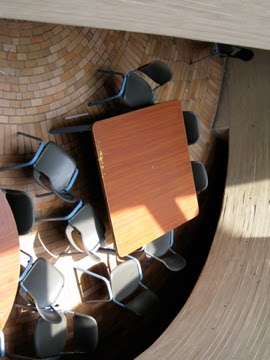 En julio de este año Chantal Mouffe publicó su más reciente libro, Agonistics: Thinking the world politically (Verso, 2013). Llevo un tiempo ya trabajando el tema de 'lo político' para desde ahí pensar y re-pensar el Derecho y el imaginario de éste que reproducimos en nuestras prácticas, discursos y quehaceres; en la inercia nuestra de cada día. Ya antes en algunos post, he expuesto y acogido algunos argumentos de Mouffe para analizar asuntos de Puerto Rico e intentar complejizar la concepción de lo político que aquí se impone y que a veces se oculta bajo la mirada jurídico-constitucional. Por eso, le sigo el rastro a Mouffe y desde que Verso anunció que este libro se publicaría, lo tuve en agenda. Acabo de terminar de leerlo y comparto un brevísimo comentario.
En julio de este año Chantal Mouffe publicó su más reciente libro, Agonistics: Thinking the world politically (Verso, 2013). Llevo un tiempo ya trabajando el tema de 'lo político' para desde ahí pensar y re-pensar el Derecho y el imaginario de éste que reproducimos en nuestras prácticas, discursos y quehaceres; en la inercia nuestra de cada día. Ya antes en algunos post, he expuesto y acogido algunos argumentos de Mouffe para analizar asuntos de Puerto Rico e intentar complejizar la concepción de lo político que aquí se impone y que a veces se oculta bajo la mirada jurídico-constitucional. Por eso, le sigo el rastro a Mouffe y desde que Verso anunció que este libro se publicaría, lo tuve en agenda. Acabo de terminar de leerlo y comparto un brevísimo comentario.
El libro es una especie de repaso o re-visita a su 'On the Political' pero esta vez, Mouffe se acerca consciente de los últimos acontecimientos mundiales y del debate que ha suscitado el activismo en los movimientos Occupy alrededor del mundo y otros movimientos y acciones en las que jóvenes parecen ser los y las protagonistas. Vale la pena pasar nuevamente por sus propuestas sobre lo agónico en lo político, sus críticas a la noción del razonamiento deliberativo y la propuesta de democracia o política radical. Hay un nuevo capítulo que sirve de conclusión al libro y en el que Mouffe se explicita sobre cómo su propuesta ha variado a raíz de los últimos acontecimientos. Incluye, además, una entrevista que le hicieron sobre estos temas en el 2007.
En todo caso, recomiendo el libro. Dejo un fragmento de su conclusión, que replantea el elemento agónico de lo político y que merece verse de cerca. Sigamos. A los y las interesadas, que lo disfruten y ojalá podamos comentarlo.
"I would like to propose a different interpretation of the current mobilizations. In On the Political where I criticized the prevalent 'post-political trend', my diagnosis was that we were witnessing a crisis of representation as a consequence of 'the consensus at the centre' that had come to dominate politics in most liberal democratic societies. This consensus, which is the result of the unchallenged hegemony of neoliberalism, deprives democratic citizens of an agonistic debate where they can make their voices heard and choose between real alternatives.
Until recently, it was mainly through right-wing populists parties that people were able to vents their anger against such a post-political situation. With the recent protests, we are seeing the emergence of other , much more estimable ways of reacting against the democratic deficit that characterizes our 'post-democratic' societies. But in both cases, what is at stake is a profound dissatisfaction with the existing order. If so, many people, not only among the youth but across the whole population, are now taking the street, it is because they have lost faith in traditional parties and they feel that their voices cannot be heard through traditional political channels. As one of the mottos of the protesters claims, 'We have a vote but we do not have a voice'.
Understood as refusal of the post-political order, I suggest that the current protests can be read as a call for a radicalization of liberal democratic institutions, not for their rejection. What they demand are better, more inclusive forms of representation. To satisfy their desire for a 'voice', existing representative institutions have to be transformed and new ones established, so as to create the conditions for an agonistic confrontation where citizens would be offered real alternatives. Such a confrontation requires the emergence of a genuine left able to offer an alternative to the social liberal consensus dominant in the center-left parties."
pp. 119-120.
